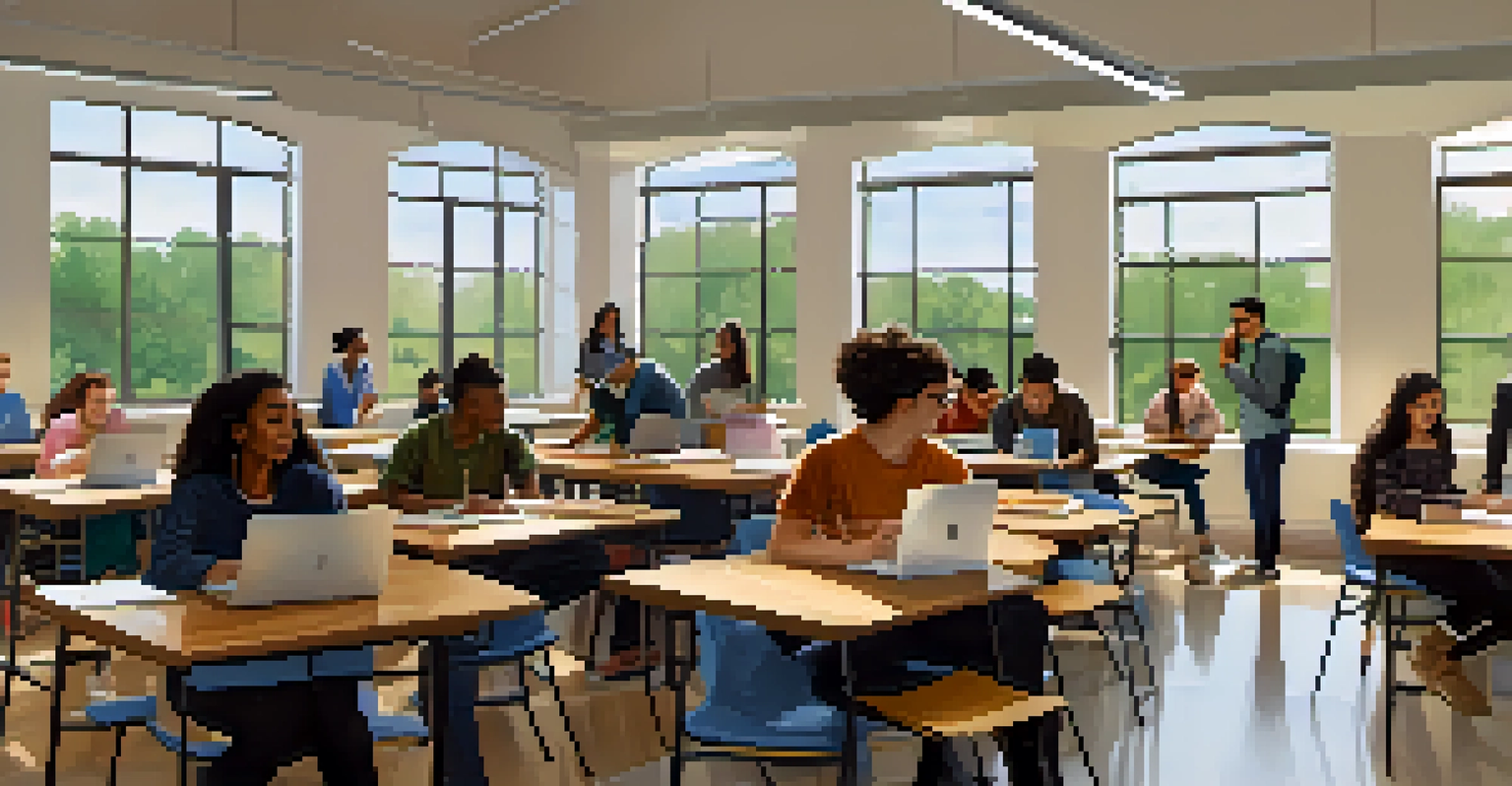Washington State's Economic Resilience During Challenges

The Economic Landscape of Washington State
Washington State is known for its diverse economy, which includes technology, agriculture, and manufacturing. Major companies like Microsoft and Amazon have their roots here, contributing significantly to the local economy. This diversity helps the state remain resilient even during tough economic times, as different sectors can support one another.
In the middle of difficulty lies opportunity.
For example, when the tech industry faces downturns, agriculture and manufacturing can often step in to stabilize the economy. The state's rich natural resources, including timber and seafood, further bolster this resilience. By leveraging its unique assets, Washington has built a robust economic foundation that can weather various storms.
Moreover, the state's strategic location on the West Coast facilitates trade with Asia and other parts of the world. This connectivity opens up numerous opportunities for businesses to expand and adapt, ensuring that Washington's economy continues to evolve in response to global challenges.
Adapting to Economic Shifts: A Historical Perspective
Historically, Washington State has faced various economic challenges, from the Great Depression to the 2008 financial crisis. Each time, the state demonstrated an impressive ability to adapt and rebound. For instance, during the recession, Washington's tech sector emerged as a critical driver of recovery, showcasing the importance of innovation.

The state's history of resilience can be attributed to a culture that encourages entrepreneurship and risk-taking. Many local businesses pivoted their strategies, focusing on new markets and technologies to stay afloat. This adaptability is a hallmark of Washington's economic identity.
Diverse Economy Ensures Resilience
Washington State's varied economic sectors, including technology, agriculture, and manufacturing, help it remain stable during economic fluctuations.
In learning from past challenges, Washington has developed a proactive approach to economic planning. With initiatives aimed at fostering growth in emerging industries, the state continues to position itself favorably for future uncertainties.
The Role of Higher Education and Research Institutions
Higher education institutions in Washington play a pivotal role in fostering economic resilience. Universities like the University of Washington not only provide education but also drive research and innovation. This connection between academia and industry leads to the development of new technologies and business models, creating jobs and boosting the economy.
The best way to predict the future is to create it.
Programs that encourage entrepreneurship among students help cultivate the next generation of business leaders. By equipping young minds with the skills they need, Washington ensures a steady flow of talent into the workforce. This focus on education and research is critical for maintaining the state's competitive edge.
Moreover, partnerships between universities and local businesses facilitate the transfer of knowledge and technology. These collaborations often lead to innovative solutions that address current economic challenges, further solidifying the relationship between education and economic success.
The Impact of the COVID-19 Pandemic
The COVID-19 pandemic presented unprecedented challenges to economies around the world, and Washington was no exception. However, the state's diverse economic base helped cushion the blow. While some sectors, like tourism and hospitality, faced significant setbacks, others, particularly tech and healthcare, thrived during this period.
Local businesses quickly adapted to new consumer behaviors, shifting to online sales and remote work models. This adaptability demonstrated the resilience of Washington's entrepreneurial spirit, allowing many businesses to not just survive but also innovate. For instance, restaurants transitioned to delivery services, while tech companies expanded remote work capabilities.
Community Support Strengthens Economy
Grassroots initiatives encouraging local shopping foster community connections and bolster Washington's economic recovery.
Government support, such as grants and relief programs, also played a crucial role in helping businesses weather the storm. By providing resources and assistance, Washington's leadership helped stabilize the economy and set the stage for recovery as conditions improved.
Sustainability as a Key to Future Resilience
Sustainability has become a focal point for Washington's economic strategy, as the state seeks to build a resilient economy that benefits both people and the planet. Initiatives aimed at reducing carbon emissions and promoting clean energy are gaining traction, positioning Washington as a leader in sustainable practices. This commitment to sustainability not only helps the environment but also creates new economic opportunities.
For example, the growth of the renewable energy sector has led to job creation in areas like solar and wind energy. As more companies prioritize sustainability, Washington can capitalize on this trend, attracting businesses that align with these values. This shift towards a greener economy is essential for long-term resilience.
Moreover, sustainable practices can enhance the quality of life for residents, making Washington an attractive place to live and work. By fostering an economy that prioritizes both economic growth and environmental stewardship, the state is setting itself up for future success.
Community Support and Local Initiatives
Community support plays a vital role in Washington's economic resilience. Local initiatives that encourage residents to shop small and support local businesses help to strengthen the economy. These grassroots movements not only boost local economies but also foster a sense of community and connection among residents.
For instance, during challenging times, many Washingtonians rallied around struggling businesses, promoting them on social media and participating in fundraising efforts. This collective effort demonstrates the power of community in overcoming economic hurdles and building a stronger local economy.
Sustainability Drives Future Growth
The state's focus on sustainable practices not only addresses environmental challenges but also creates new economic opportunities.
In addition, local governments are increasingly investing in programs that support economic development at the community level. By focusing on the unique needs and strengths of individual communities, Washington can ensure that its recovery efforts are inclusive and effective.
Looking Ahead: Strategies for Continued Resilience
As Washington State looks to the future, several strategies can help ensure continued economic resilience. Emphasizing technology and innovation will be crucial, as these sectors are likely to drive growth in the coming years. Investing in digital infrastructure and promoting tech education can help prepare the workforce for the jobs of tomorrow.
Additionally, fostering partnerships between the public and private sectors can support economic development initiatives. Collaborations that focus on job creation and skills training will ensure that Washington remains competitive in the global economy. By working together, stakeholders can address challenges and seize opportunities more effectively.

Finally, maintaining a strong focus on sustainability will be essential for long-term economic resilience. By prioritizing environmentally friendly practices and industries, Washington can create a robust economy that not only withstands challenges but also thrives in an ever-changing world.